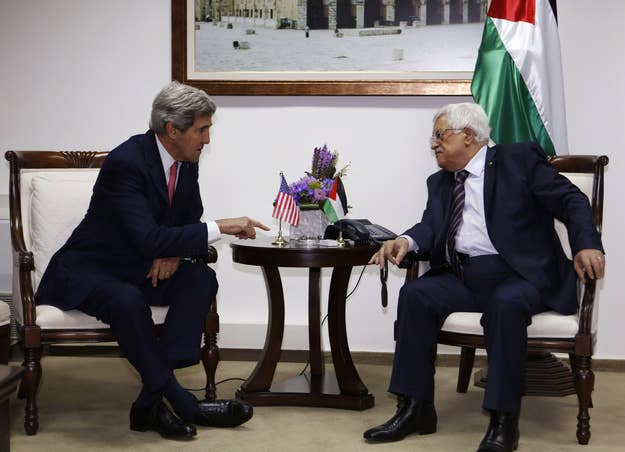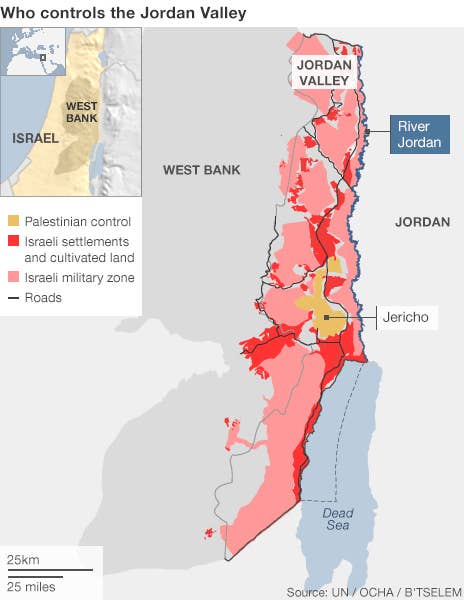
JERUSALEM — The Israeli and Palestinian leaderships tried to calm their constituents this week by downplaying an upcoming visit by Secretary of State John Kerry to push the two sides to agree to a framework for a future peace deal.
Neither side is keen to be seen as issuing an outright rejection of the U.S. framework, which Kerry is expected to present when he visits on Thursday, nor are they eager to accept what they see as a compromising document. Instead, both sides have made moves to let the U.S. know that they won't make it easy to get a framework agreed upon.
While agreeing to a release of 26 long-serving Palestinian prisoners over the weekend, Israeli officials have also made made plans for construction of 1,400 new settlement housing units, as reported widely in the Israeli media. Palestinian officials, meanwhile, have increasingly voiced public disdain for the U.S. peace push, and accused the White House of holding a pro-Israel agenda that ignores the needs of Palestinians.
"If Kerry wants to see this agreement happen, he will have to drag the Palestinians and the Israelis to the table kicking and screaming. In back channel talks, the Palestinians have said that there are major points that are unacceptable to them, and the Israelis have said that they won't 'follow the rules' set out for them by the Americans. So there you have it, peace in 2014," said one British member of the Middle East Quartet in Jerusalem.
U.S. officials have told BuzzFeed that Kerry is "determined to get the framework signed by the end of January 2014," and that his visit to Jerusalem this Thursday, his 10th to the city since taking on the Israeli-Palestinian peace process, was emblematic of his "commitment to this process."
The details of the framework Kerry is expected to present are unclear, but U.S. officials have said that it will be based on 1967 borders with minor adjustments for land swaps, and a long-term military presence by Israel in the Jordan Valley.
It's the second point, on the Jordan Valley, that has become a major point of disagreement between the two parties. Last week, Israel's ministerial committee on immigration approved a bill that would see Israel annex the Jordan Valley, a strip of land between the West Bank and Jordan that Palestinians see as part of their future state, but that Israel wants to retain due to lucrative farms there and a security interest in patrolling the border between a future State of Palestine and Jordan.

Palestinian officials said they were infuriated that Israel would even consider debating the annexation of the Jordan Valley while peace talks were ongoing.
Palestinian President Mahmoud Abbas said Tuesday morning that the issue was a "red line" for Palestinians.
"If they do that, which we will not allow, we will see what the future holds. This land is ours and will remain Palestinian land, and everybody should know that this is a red line that can't be crossed," Abbas said.
One Palestinian official involved in the peace talks said he believed that Israel's push to annex the Jordan Valley was meant to make the security arrangements proposed by Kerry appear "a better option to Palestinians."
"They propose this completely crazy thing, of annexing the Jordan Valley, just to try and bully us into pushing what the Americans want, which is letting Israel maintain security access and control to the Jordan Valley for decades to come," said the official. "We know what this looks like, when they control an area it becomes theirs."
He said that rather than try to engage with Palestinian officials to try to find a compromise on the Jordan valley, U.S. officials had focused on meeting Israeli security needs.
Israeli officials, meanwhile, said that Kerry's framework would be never be accepted by Netanyahu's largely right-wing government, most of which opposes withdrawal from any settlements or outposts.
A report in Haaretz quoted four Israeli ministers as saying that Netanyahu had personally downplayed the significance of the framework agreement to his coalition, leaving Haaretz to call it a "document with no practical implications."
In a cabinet meeting last week, Netanyahu said the U.S. had yet to send Israel a draft of the framework.
"If they do send us a paper, it will include all the known core issues, like borders, security arrangements, Jerusalem, the refugees and recognition of Israel as a Jewish state," said Netanyahu. "But the paper is just principles for conducting the negotiations, not a new proposal for solving the conflict. Our position is different from that of the Americans, and certainly from that of the Palestinians."
